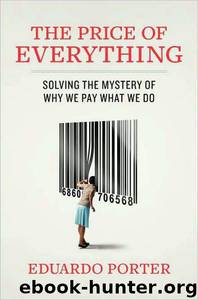The Price of Everything by Eduardo Porter

Author:Eduardo Porter
Language: eng
Format: mobi, epub
Tags: Non-fiction, Sociology, Psychology, Business, Science
ISBN: 9781591843627
Publisher: Portfolio Penguin
Published: 2010-01-02T00:00:00+00:00
SUPPORTERS OF PRIVATE financing of political campaigns claim the purchase of political influence in the United States is very different from buying votes. Politicians use money to provide voters with information needed to reach a decision. TV ads are meant to convince voters that a candidate is the best and most viable—or that her rival is unworthy. If it looks as if the candidate with the most money always wins, it’s because good candidates are good at drawing campaign contributions. And if politicians vote the way their financial donors would want them to, it’s because they agree with them anyway.
This defense doesn’t fit reality, unfortunately. American campaign strategists deploy sophisticated marketing techniques rather than cold cash. They stroke voters’ biases rather than pay them. They seduce rather than buy. But their objective too is to get as many voters as possible to ignore their self-interest and vote for them. I admit that governance in the United States is better than in São Tomé and Príncipe. There are more institutional checks on power. Despite occasional bursts of antigovernment vitriol, government is still considered mostly a legitimate institution.
By contrast, vote buying in São Tomé and Príncipe delegitimizes democracy in the eyes of voters. Politicians who pay for a vote won’t feel constrained by policy commitments. Voters who took politicians’ cash won’t waste time keeping an eye on the quality of governance. Social scientists who have studied political institutions in the developing world argue that the ability of the rich to buy the votes of the poor contributes to poor countries’ unshakable poverty, hindering redistributive policies. São Tomé and Príncipe has had already two coups since its first free elections in 1991. It is in 111th place out of 180 in Transparency International’s corruption perceptions index—alongside kleptocracies such as Egypt and Indonesia.
But both political cultures rely on the purchasing of power. The key differences are the way power is bought and its price. In the United States votes are much more expensive. In a way, the difference between the forms of payment for elections in the United States and São Tomé and Príncipe and replicates the difference between corruption and its rich cousin, lobbying. Big firms in rich countries prefer lobbying—the use of money to persuade politicians to change the law—because it has more permanent effects. But it is too expensive for smaller firms in poor countries, which instead turn to corruption: using money to sway bureaucrats to ignore the law.
The United States may rank ninety-two rungs above São Tomé and Príncipe on Transparency International’s corruption perception index. But it is unlikely those surveyed by the corruption watchdog took into account the $3.5 billion spent by industries in 2009 to lobby Congress and the White House to tailor laws more to their liking. They probably rarely think about the 1,447 former federal government employees—including 73 ex-members of Congress—hired by financial institutions to lobby Congress and influence the debate over the reform of financial regulation in 2009 and 2010. The finance, insurance, and real estate industry alone spent $467 million lobbying in 2009.
Download
This site does not store any files on its server. We only index and link to content provided by other sites. Please contact the content providers to delete copyright contents if any and email us, we'll remove relevant links or contents immediately.
International Integration of the Brazilian Economy by Elias C. Grivoyannis(109625)
The Radium Girls by Kate Moore(12014)
Turbulence by E. J. Noyes(8040)
Nudge - Improving Decisions about Health, Wealth, and Happiness by Thaler Sunstein(7689)
The Black Swan by Nassim Nicholas Taleb(7106)
Rich Dad Poor Dad by Robert T. Kiyosaki(6603)
Pioneering Portfolio Management by David F. Swensen(6288)
Man-made Catastrophes and Risk Information Concealment by Dmitry Chernov & Didier Sornette(6002)
Zero to One by Peter Thiel(5786)
Secrecy World by Jake Bernstein(4740)
Millionaire: The Philanderer, Gambler, and Duelist Who Invented Modern Finance by Janet Gleeson(4464)
The Age of Surveillance Capitalism by Shoshana Zuboff(4274)
Skin in the Game by Nassim Nicholas Taleb(4235)
The Money Culture by Michael Lewis(4196)
Bullshit Jobs by David Graeber(4179)
Skin in the Game: Hidden Asymmetries in Daily Life by Nassim Nicholas Taleb(3987)
The Dhandho Investor by Mohnish Pabrai(3758)
The Wisdom of Finance by Mihir Desai(3728)
Blockchain Basics by Daniel Drescher(3574)
